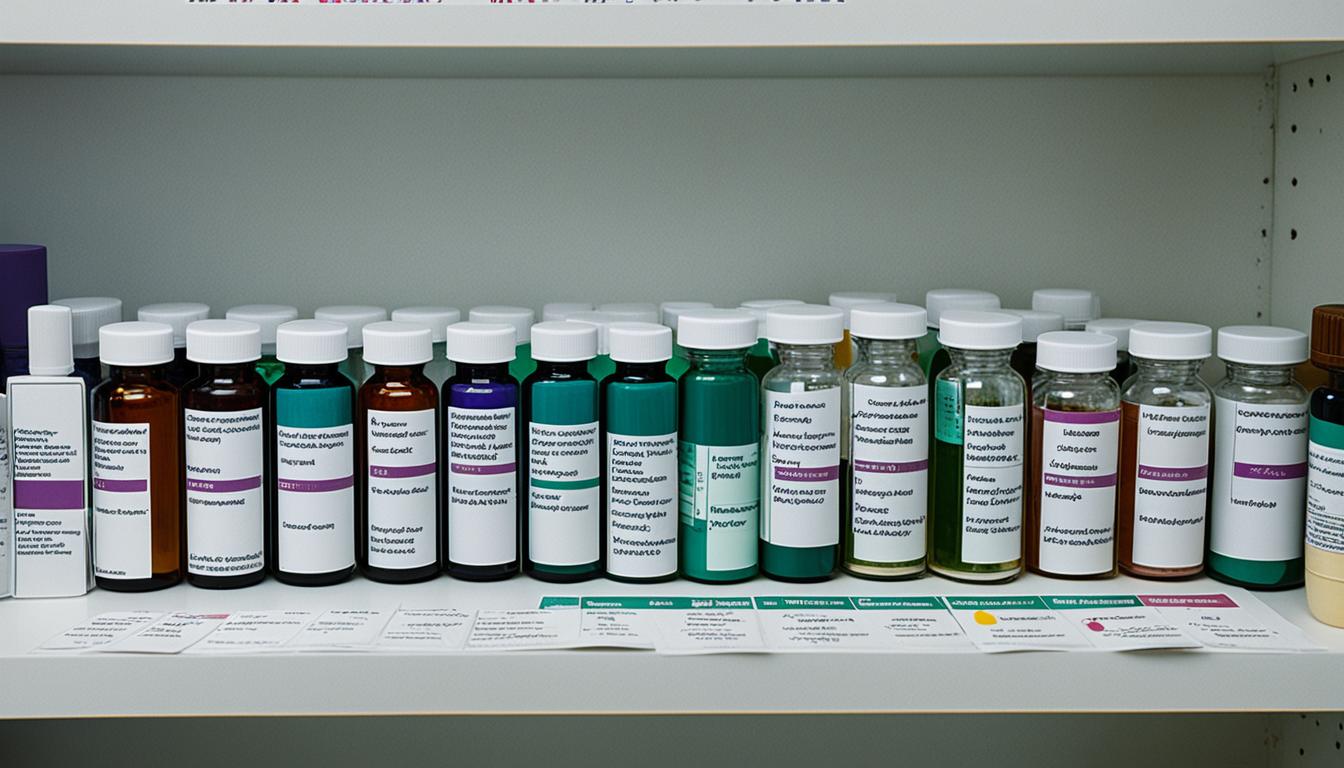As a man, finding out your breasts are growing can be tough. I didn’t know what to think when my chest started changing. It got a bit bigger and felt different. At first, I hoped it was a short phase. But soon, it was clear something was really changing. I had to face the fact my breasts were getting larger.
Many questions filled my mind. Why is this happening to me? Did I make a mistake somehow? And can I make it go away? Looking into it, I learned something shocking. The medicines I took for my health problems might be to blame.
Gynecomastia is often caused by some medications. These include drugs for depression, high blood pressure, and even certain cancer treatments. These drugs can throw off our hormones a lot. More estrogen and less testosterone can lead to growing breast tissue.
If this is something you’re dealing with, know it’s not just you. We’ll talk more about what causes this, the symptoms, and how to possibly fix it. We’ll go over the newest findings, what to look out for, and what steps you can take to feel better and more in charge of your body.
Key Takeaways
- Certain medications, including antidepressants, blood pressure drugs, and prostate cancer treatments, can cause gynecomastia or enlarged breasts in men.
- Gynecomastia is a result of hormonal imbalances, where estrogen levels rise while testosterone levels drop.
- Addressing the underlying medication causing the issue, through consultation with a healthcare provider, is often the first step in managing gynecomastia.
- Monitoring breast changes and seeking medical advice early on is crucial to understanding the cause and finding appropriate treatment options.
- Ongoing research continues to explore new ways to prevent and manage medication-induced gynecomastia, offering hope for those affected.
What is Gynecomastia?
Gynecomastia means men have bigger breasts than usual. It might worry you to see this, but it’s often not harmful. Many men from 50 to 80 years old face this issue. It affects some 24% to 65% of them.
Definition and Overview
In men, Gynecomastia is when breast tissue grows too much. Newborns, teenagers, and older men might experience it. Usually, it’s linked to hormone imbalances between testosterone and estrogen.
Symptoms of Gynecomastia
The key sign is larger or swollen breasts in men. It could happen on just one side or both. Men might also feel tenderness or pain in the area.
| Gynecomastia Occurrence Rates | Age-related Statistical Data |
|---|---|
| About 24% to 65% of men ages 50 to 80 experience gynecomastia. | More than half of male newborns are born with enlarged breasts due to effects of estrogen. Gynecomastia caused by hormone changes during puberty is common and may resolve within 6 months to 2 years. |
Hormonal Imbalances and Breast Growth
Men usually make more of the sex hormone, testosterone, in their bodies. Yet, small amounts of estrogen are also produced. When estrogen becomes more than testosterone, men might develop bigger breasts. This change is called gynecomastia. Many things can lead to this hormonal imbalance. These include conditions that decrease testosterone, raise estrogen, or block testosterone’s effects.
Role of Testosterone and Estrogen
Testosterone is key for male features and is the main male hormone. On the other hand, estrogen is the main female hormone, but men also produce a bit. If estrogen gets higher than testosterone, it can cause men to grow breast tissue. This is known as hormonal imbalances and breast growth.
Natural Hormone Changes Causing Gynecomastia
Gynecomastia can be due to normal hormonal shifts at different life stages. For example, newborns and teenage boys sometimes see their breasts enlarge briefly. Older men may experience it as testosterone naturally lowers with age. This process is called natural hormone changes gynecomastia. It’s why male hormone imbalance breast enlargement happens among the elderly as testosterone decreases.

Can certain medications cause breast enlargement?
Some medications can lead to gynecomastia in men. They do this by changing our hormone balance. This change can result from too much prolactin, estrogen, or too little androgens.
Medications Affecting Prolactin Levels
Certain drugs, like some antidepressants and antipsychotics, can raise prolactin levels. Others include drugs for Parkinson’s. High prolactin levels may grow breast tissue in men. Bromocriptine and cabergoline might be used to treat high prolactin linked with gynecomastia.
Medications with Estrogen-like Effects
Some drugs can act like estrogen in the body. For instance, drugs for prostate cancer, such as bicalutamide and flutamide, are known to cause this issue. SERMs can help balance estrogen and support in treating gynecomastia.
Anti-Androgen Medications
Anti-androgens are medicines that lessen testosterone’s effects. Spironolactone is a well-known drug that can cause gynecomastia in about 29% of men. They can disturb the balance between testosterone and estrogen, leading to breast growth.
Understanding that some medications can cause gynecomastia is key. This knowledge helps in noticing any unwanted breast changes. Talk to your doctor if you see any changes. They can help you find a suitable treatment based on your needs.
Risk Factors for Medication-Induced Gynecomastia
Gynecomastia, the development of enlarged breasts in men, has several risk factors. Especially in medication-induced cases, knowing these risks helps identify those at higher risk. They might experience this as a side effect from certain drugs.
Age and Obesity
Age is a big gynecomastia risk factor. Newborns, teenage boys, and older men are more likely to get it. This is because their hormones are changing naturally. Also, being obese can throw off the balance between testosterone and estrogen. This leads to breast enlargement.
Underlying Health Conditions
Some health problems can up the risk for gynecomastia. Things like liver or kidney disease, thyroid issues, and certain tumors can mess with hormones. This can cause gynecomastia when taking certain medications. It’s important to keep these health issues in check to avoid or deal with breast enlargement.
Dosage and Duration of Medication Use
How much and for how long you take a drug matters too. Medications like anti-androgens, anabolic steroids, and antiretroviral drugs can up the risk. It’s key to take medicines as the doctor prescribes and keep an eye on your breast size. Doing this can lower the chance of getting gynecomastia from medication.
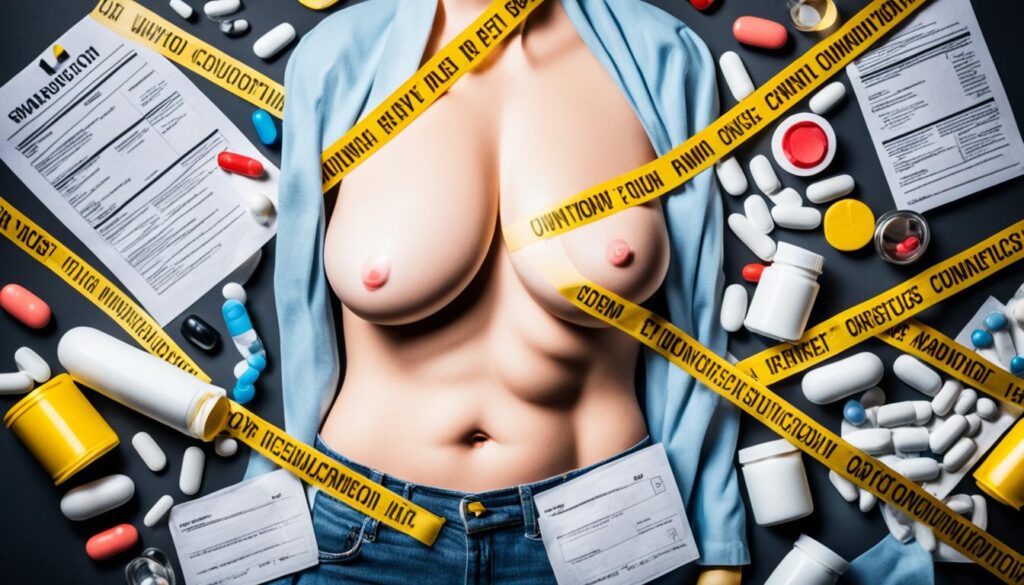
Preventing and Treating Gynecomastia
Gynecomastia means enlarged breasts in men. It’s key to figure out what’s causing this with your doctor. They might suggest stopping certain meds first. If you stop those medicines, the problem might get better with time.
Lifestyle Changes
Making lifestyle changes can help with preventing gynecomastia or dealing with its effects. Staying at a healthy weight is crucial. This involves eating well and exercising. It helps balance your hormones, potentially reducing gynecomastia.
It’s important to cut down on alcohol, too. Too much can throw off your hormone balance.
Medication Adjustments
Some men may still have gynecomastia even after stopping problem meds. In these cases, doctors might prescribe other drugs. Medications like tamoxifen help fix hormone imbalances by adjusting testosterone and estrogen levels.
Surgical Options
If nothing else works, surgery might be an option. There are procedures like liposuction or direct tissue removal. These can make the chest look more like it should for a man. But, surgery should always be the last choice. Lifestyle changes and medications come first.

Specific Medications Linked to Gynecomastia
Some medicines are more likely to cause gynecomastia, which is male breast enlargement. For instance, drugs used to treat prostate cancer, such as bicalutamide and flutamide, have a high risk. Up to 70% of people who use these drugs may develop gynecomastia over time.
Spironolactone, a medicine for blood pressure, is also frequently associated with this side effect. It can affect almost 29% of men taking it, resulting in gynecomastia.
| Medication | Gynecomastia Risk |
|---|---|
| Bicalutamide (prostate cancer drug) | Up to 70% risk |
| Flutamide (prostate cancer drug) | Up to 70% risk |
| Spironolactone (blood pressure medication) | Up to 29% risk |
If you’re taking medications known to cause gynecomastia, stay alert to any signs. Keep an eye on your chest area for any changes. Talking to your healthcare provider about the issue is key to handle it well.
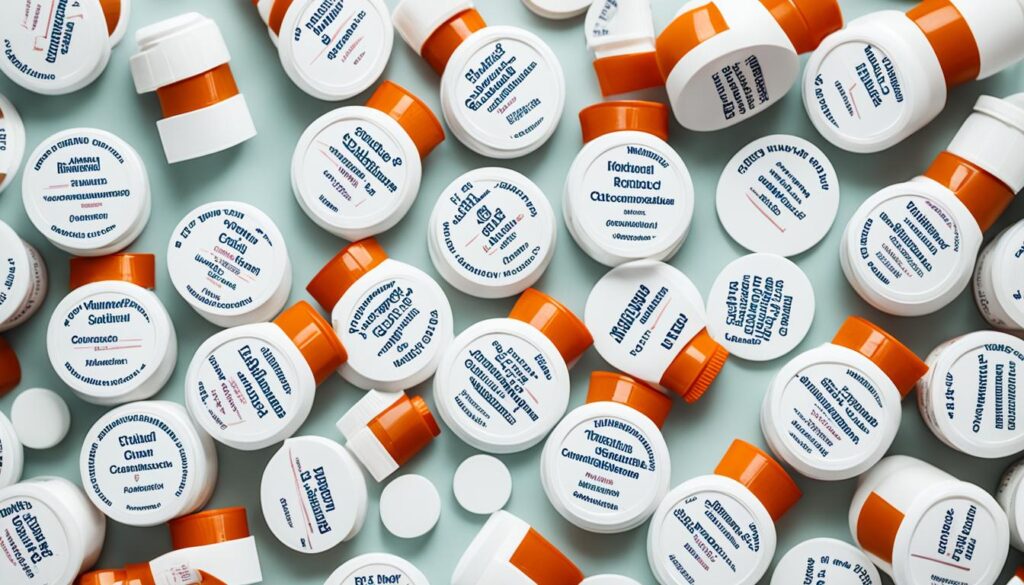
Psychological Impact of Gynecomastia
Gynecomastia is when men develop enlarged breasts, which may not be a big physical issue. But, it can deeply affect them emotionally. They might feel very self-conscious and have body image issues due to how their chest looks.
Body Image Concerns
Gynecomastia can cause men to feel bad about their bodies. They might worry about their breast size, lowering their confidence. This can make it hard for them to interact with people and enjoy life.
Emotional Well-being
The emotional scars of gynecomastia can be deep. It makes some men feel anxious, sad, and want to stay away from others. This kind of self-consciousness can really hurt their happiness and mood.
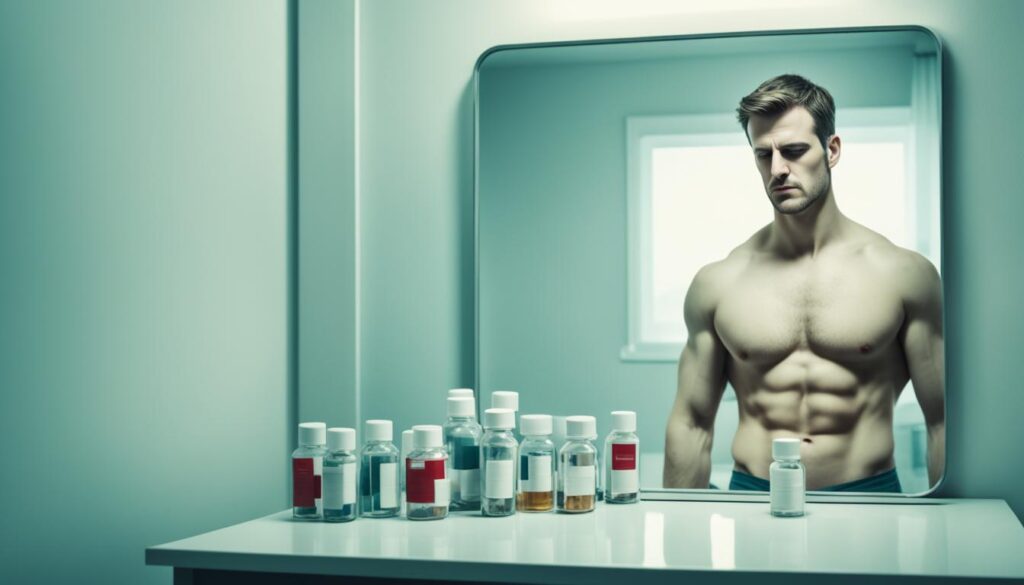
Men with gynecomastia should get help and look into their treatment options. This can make their life better, helping them cope with the emotional side of this issue. By facing these challenges, they can feel more confident and accept themselves better.
When to Seek Medical Advice
It’s crucial to get medical help if your breasts change. Any swelling, pain, or a lump under the nipple needs attention. Checking your breasts regularly lets you catch problems early.
Monitoring Breast Changes
Staying aware of any breast changes is important, especially with gynecomastia. Look for symptoms like swelling, pain, or a lump. Finding issues early can improve how well they’re treated and how you feel about them.
Discussing Treatment Options
If you see troubling changes in your breasts, talk to your doctor. They’ll check what’s causing it and suggest the best treatments like changing medicines or surgery. Your doctor will help you find what works for you.
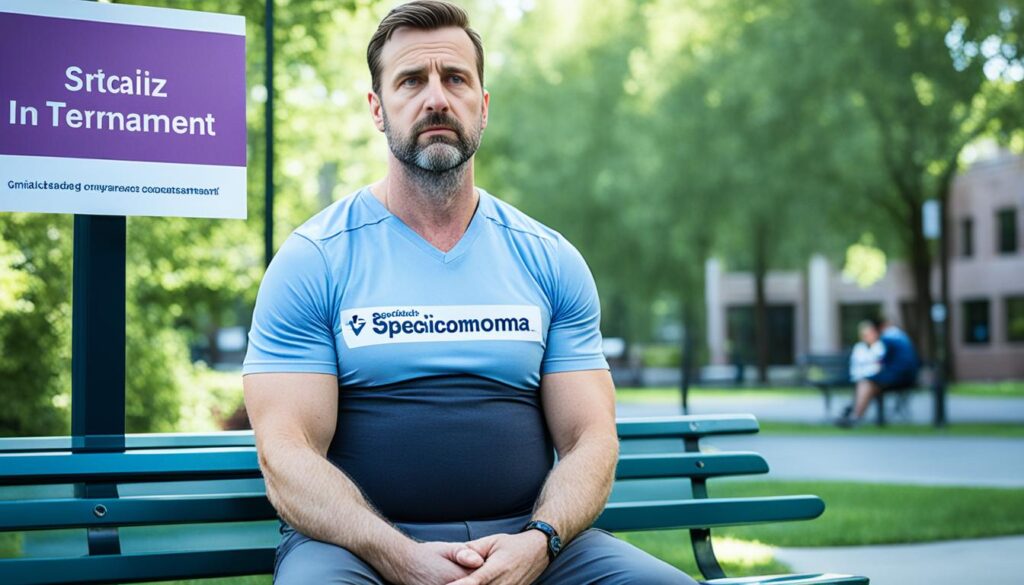
Research and Future Directions
Research on gynecomastia keeps finding new clues. This includes its causes and ways to treat it better. One big focus is on how well certain drugs can stop gynecomastia. This is key for men with prostate cancer.
Ongoing Studies
Some studies look at drugs like tamoxifen and aromatase inhibitors. These drugs change hormone levels. They might help reduce breast growth in men with prostate cancer on certain treatments.
Clinical trials are seeing how well these drugs work. They aim to reduce and slow down gynecomastia in these men.
Potential New Treatments
Novel treatments for gynecomastia are under the microscope. For example, researchers are testing laser-assisted liposuction. This could be an easier way to remove extra breast tissue in men.
There’s also hope in new drugs. These might fix the hormone issues linked to gynecomastia. This could open up new treatment paths in the future.
Overall, the work going into gynecomastia is helping a lot. It could bring better ways to prevent and manage this condition. This, in turn, could help people living with gynecomastia enjoy a higher quality of life.
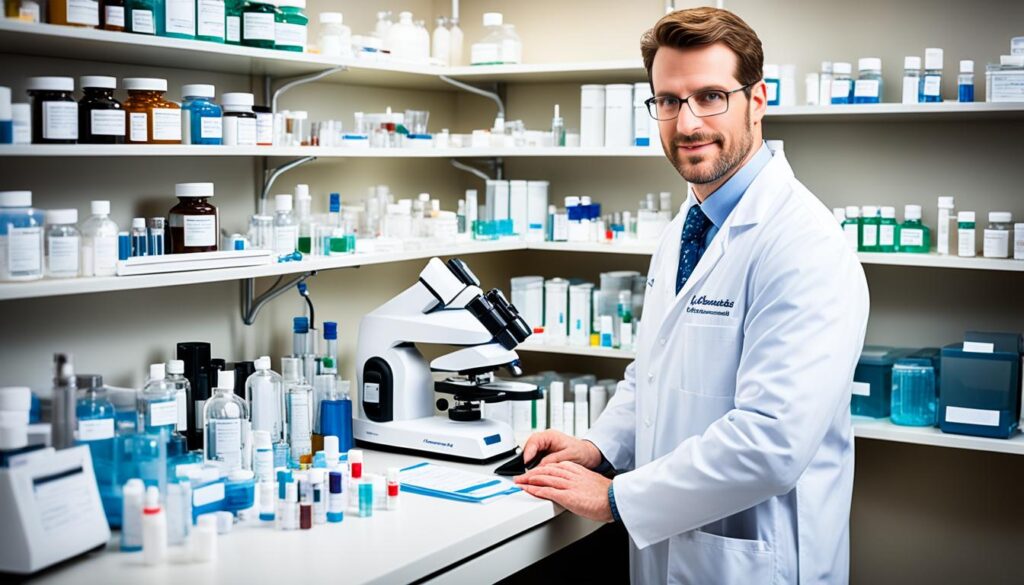
Conclusion
Gynecomastia, or larger breasts in males, can be embarrassing. It usually isn’t a serious health issue, though. Many drugs can upset the balance of male and female hormones, leading to this condition.
The research on gynecomastia is ongoing. But, it’s important to watch for any breast changes and talk to a doctor if you notice any. Working with your healthcare provider can help find ways to deal with or prevent drug-related gynecomastia. You can learn to be confident. This is true no matter what your experience or the conclusions about gynecomastia are.
Learning about how some drugs might cause gynecomastia can help us. We can make smart choices and look for ways to tackle this issue. Lifestyle changes, switching medications, or other treatments can be helpful. We can keep our health and happiness as well.
